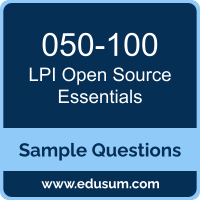 The purpose of this Sample Question Set is to provide you with information about the LPI Open Source Essentials - 050 exam. These sample questions will make you very familiar with both the type and the difficulty level of the questions on the 050-100 certification test. To get familiar with real exam environment, we suggest you try our Sample LPI Open Source Essentials Certification Practice Exam. This sample practice exam gives you the feeling of reality and is a clue to the questions asked in the actual LPI Open Source Essentials certification exam.
The purpose of this Sample Question Set is to provide you with information about the LPI Open Source Essentials - 050 exam. These sample questions will make you very familiar with both the type and the difficulty level of the questions on the 050-100 certification test. To get familiar with real exam environment, we suggest you try our Sample LPI Open Source Essentials Certification Practice Exam. This sample practice exam gives you the feeling of reality and is a clue to the questions asked in the actual LPI Open Source Essentials certification exam.
These sample questions are simple and basic questions that represent likeness to the real LPI 050-100 exam questions. To assess your readiness and performance with real time scenario based questions, we suggest you prepare with our Premium LPI Open Source Essentials Certification Practice Exam. When you solve real time scenario based questions practically, you come across many difficulties that give you an opportunity to improve.
LPI 050-100 Sample Questions:
Answers:
|
Question: 01 Answer: d |
Question: 02 Answer: b |
Question: 03 Answer: a |
Question: 04 Answer: b |
Question: 05 Answer: d |
|
Question: 06 Answer: c |
Question: 07 Answer: b |
Question: 08 Answer: d |
Question: 09 Answer: a |
Question: 10 Answer: c |
Note: For any error in LPI Open Source Essentials (050-100) certification exam sample questions, please update us by writing an email on feedback@edusum.com.
